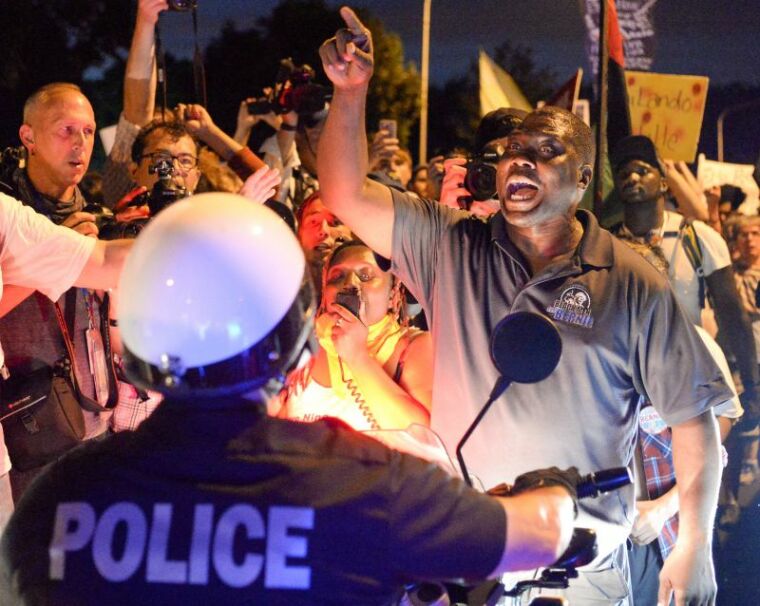Presbyterians support black reparations, free education, income guarantees

LOUISVILLE, Kentucky (Christian Examiner) – The Presbyterian Church (USA), which has been hemorrhaging members since it began pressing for gay clergy and same-sex marriage almost a decade ago, is now aligning itself with a radical "social justice" group which demands the government pay reparations to all blacks in the form of free education and income.
On Oct. 19, the denomination's news service reported that the church's Israel/Palestine Mission Network (IPMN) endorsed the platform of the group calling itself the Movement for Black Lives (MBL).
IPMN itself is a social justice organization. Its chief spokesman, Bob Ross, associate professor of global cultural studies at Point Park University in Pittsburgh, Pennsylvania, has written on the growth of "U.S. Imperialism" in the wake of the Sept. 11, 2001, attacks on New York and Washington. He said IPMN endorsed MBL because the struggle blacks in America face is the same as the struggle the Palestinians face for liberation from Israel.
"These justice struggles are linked in that the people of Palestine are in solidarity with black people in America struggling for freedom, justice and equality," Ross said. "The black struggle and the Palestinian struggle for justice are not just parallels, but they're struggles where there is an exchange of ideas."
These justice struggles are linked in that the people of Palestine are in solidarity with black people in America struggling for freedom, justice and equality," Ross said. "The black struggle and the Palestinian struggle for justice are not just parallels, but they're struggles where there is an exchange of ideas.
IPMN is also the organization behind the the PCUSA's anti-Israel BDS (boycott, sanction and divest) movement. That movement wants to remove investments in companies that do business in and with Israel from the PCUSA's retirement funds. According to the denomination, the new endorsement expresses unity between the Palestinian and the social justice movement for blacks in America.
"We cannot, therefore, continue to call for a just peace in Israel/Palestine without also working in solidarity with black people in America toward justice and liberation," Ross said.
"For quite some time now we've felt as Christians, in general, but as Christians working for justice in particular, we can't limit ourselves to one place or one issue or one set of people. We need to keep our eyes and hearts open to other justice struggles around the world and here in the U.S."
The Movement for Black Lives is not "Black Lives Matter," but there is little distinguishing the two. Though it is more academic and refined in its packaging, its platform, in fact, was written with the assistance of more than 25 racial and social justice groups, including Black Lives Matter Network.
Its platform calls for an end to violence against blacks – though not for an end to black on black crime like the epidemic plaguing Chicago, Baltimore and Detroit – but an invest-divest strategy that punishes companies that won't align with the black social justice movement, black control of black communities and special political powers for blacks.
In its platform on ending violence against blacks, the MBL calls for an end to the prison system, the use of money for bail, the death penalty, the "mass surveillance of black communities," and for an end to "the war on black trans, queer and gender nonconforming people." The group also calls for the federalizing of all law enforcement and an end to private education.
One of the most controversial planks in the platform is that of reparations for "past and continuing harms." Those payments to blacks, according to the MBL, should include "full and free access for all black people (including undocumented and currently and formerly incarcerated people) to lifetime education." Costs for education, incurred through student loans, should be reimbursed to blacks, even retroactively, the group claims.
Blacks should also be provided with a "guaranteed minimum livable income," according to the MBL.
The endorsement and the "intersectionality" of the black and Palestinian social justice movements will be discussed at IPMN's annual meeting Oct. 27-29 at Pittsburgh Theological Seminary.
However, an alignment of the church with both the pro-Palestinian and violence-laden black "social justice" movement is likely to drive conservatives further away from the church. Many may have already left.
Since the PCUSA approved the ordination of openly-gay ministers in 2011, the denomination has fractured.
In 2005, the PCUSA reported its membership rolls at 2.3 million. That number dropped to 2.1 million by 2008 and 1.9 million by 2011 when the group began allowing the ordination of homosexuals. By 2014, the denomination had declined to 1.6 million.